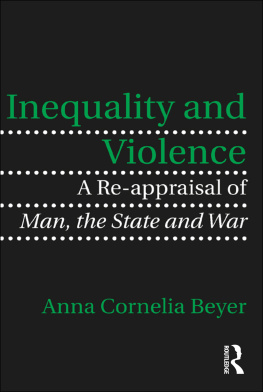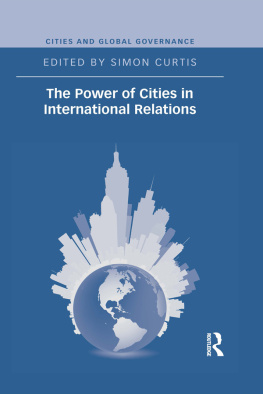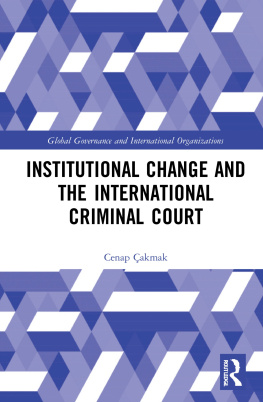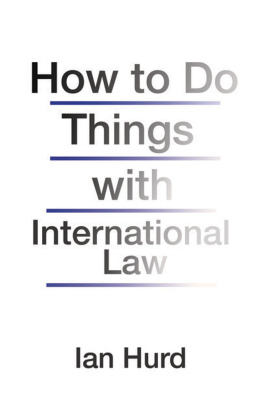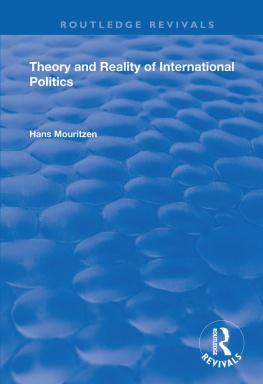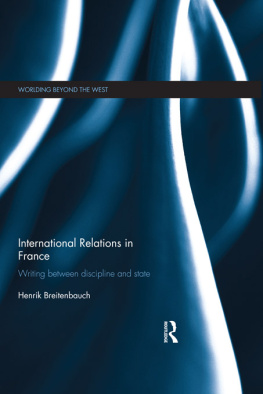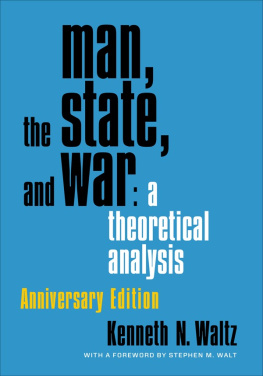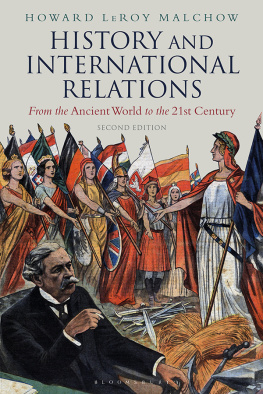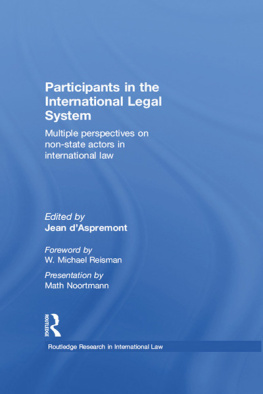INEQUALITY AND VIOLENCE
Inequality and Violence
A Re-appraisal of Man, the State and War
ANNA CORNELIA BEYER
University of Hull, UK
First published 2014 by Ashgate Publishing
Published 2016 by Routledge
2 Park Square, Milton Park, Abingdon, Oxon OX14 4RN
711 Third Avenue, New York, NY 10017, USA
Routledge is an imprint of the Taylor & Francis Group, an informa business
Copyright Anna Cornelia Beyer 2014
Anna Cornelia Beyer has asserted her right under the Copyright, Designs and Patents Act, 1988, to be identified as the author of this work.
All rights reserved. No part of this book may be reprinted or reproduced or utilised in any form or by any electronic, mechanical, or other means, now known or hereafter invented, including photocopying and recording, or in any information storage or retrieval system, without permission in writing from the publishers.
Notice:
Product or corporate names may be trademarks or registered trademarks, and are used only for identification and explanation without intent to infringe.
British Library Cataloguing in Publication Data
A catalogue record for this book is available from the British Library.
The Library of Congress has cataloged the printed edition as follows:
Beyer, Cornelia.
Inequality and violence : a re-appraisal of Man, the state and war / by Anna Cornelia Beyer.
pages cm
Includes bibliographical references and index.
ISBN 978-1-4724-2352-8 (hardback) ISBN 978-1-3155-8845-2 (ebook) ISBN 978-1-3171-1697-4 (epub) 1. Waltz, Kenneth N. (Kenneth Neal), 1924-2013. Man, the state and war. 2. International relationsPhilosophy. 3. State, The. 4. War. I. Title. JZ1316.B48 2014 327.101dc23
2013041452
ISBN 9781317116974 (hbk)
ISBN 9781315588452 (ebk PDF)
ISBN 9781317116974 (ebk ePUB)
Contents
Acknowledgements
This book would not have been written without the help of many. Kenneth Waltz kindly invited me to his home in Bangor for interviews, and provided me with an abundance of useful information, which is partly reflected in this book. His wife, Helen, many of his colleagues and his students agreed to be interviewed on Kens life and career, as well as his thinking; some of the interviews are presented in this book. Justin Rosenberg, Campbell Craig and Adam Humphreys worked with me through the preliminary stages, and I am grateful for their useful ideas and input. Ken Booth gave helpful advice and provided me with an opportunity to present earlier elements of this book at Aberystwyth. The book benefited much from the feedback gained there. I subsequently met Kenneth Waltz at Aberystwyth at the King of Thought conference as well as in New York on an invitation to the International Studies Association Conference. The University of Leuven presented me with opportunities for additional research for this book and the members of staff and students who commented on the draft brought it forward. Likewise, I benefited from the opportunity to present and discuss the main ideas for this book at the University of St Andrews. I am also deeply grateful to the University of Hull and the Department of Politics and International Studies and their support and patience while completing this book. Athina Karatzogianni and Caroline Kennedy read final versions of the manuscript. The staff at Ashgate were always very helpful and supportive. Special thanks are due to my family, who enabled travels to the US and stayed with me through the ups and downs of writing this book. It is due to all of those above that this book was finally completed.
Chapter 1
Introduction
Introduction
What does one write about a persons life if this life was to a large extent intellectual? Kenneth Waltz, born 1924, was one of the most prominent scientists in the area of International Relations. He developed the theory of structural Realism or Neorealism. This theory replaced classical Realism and broadened its approach by a systemic variable. Obviously, for us as International Relations (IR) scholars, his main achievements are the books Man, the State and War (MSW), published in 1959, and Theory of International Politics, 1979. Both of these books have quickly become important in the field, started a life of their own, and prosper until this day. These books are the brainchildren of Kenneth Waltz, and with them he fulfilled himself a lifes dream: to write a theory of international relations. Most would agree he has achieved that goal with Theory of International Politics. This book was and still is enormously influential as one of the first scientific theories on International Relations, and one of the most parsimonious and profound ones. The theory of structural Realism is used, applied and respected to this day, more than 30 years after the book was published. We have acquired more knowledge about international relations in the past 30 years, with many further explanations and theories, but structural Realism still remains one of the prominent approaches. However, the groundwork for it has been laid with the earlier publication of MSW. This book already developed the theoretical understandings of the conditions of international relations, in particular the international system and the motives and constraints of actors behaving within it. Waltz with this publication gave a broad overview and analysis of the literature and knowledge in IR of this time, which served as the basis for the latter development of his theory of international politics. MSW therefore will be of interest here for us. It, too, has been majorly influential in the discipline and is read widely today.
What is the history behind this great success story in political science? Kenneth started his life as the son of a small, rather poor American family in Ann Arbor, Michigan: the son of a pasteurizer and a housewife. His parents taught him the value of hard work, and encouraged him to pursue his lifes dream. But it was not easy for Kenneth to find out what he wanted to do. The dream rather found him. As a schoolboy, Kenneth always experienced the benefits of his superior intellectual capability in achieving outstanding results with nearly no effort. So, he put his extra energy into work, to make up for the lack of resources that could not be provided by his family. He was the guy on and off, as the Americans say, having many jobs in this time, but never deciding what to do with his life. Acting was an early fascination, but turned out to be more of a disappointment, because quickly he learned that even if he could memorize the lines very well, he did not excel in performing. When university education approached, he therefore faced a major difficulty of decision. The professional instructors recommendation was to study music, but Ken could only play the banjo. He finally started the study of economics at Oberlin College, as he thought that one should pursue studies not only for the sake of intellectual inspiration and pleasure, but again an influence of his upbringing and background with respect to the work that can follow from this. Initially not wanting to be a writer or teacher, as he lacked the experience and believed not to like writing or teaching at the time, he also decided that he did not want to be a lawyer, engineer or mathematician either. His choice of study would later on deeply influence his thinking about international relations.

